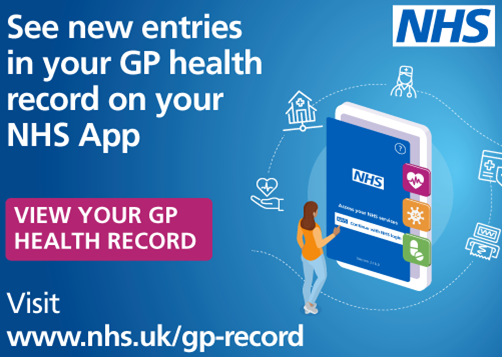Patient Record
Online Medical Record Access
If you would like to see your medical records using online services, please complete the form below and bring to the reception front desk at the surgery along with photographic identification.
Online Medical Record Access Form
More information can be found by clicking here
Sharing Your Medical Record / National Data Opt Out
Increasingly, patient medical data is shared e.g. between GP surgeries and District Nursing, in order to give clinicians access to the most up to date information when attending patients.
The systems we operate require that any sharing of medical information is consented to by patients beforehand. Patients must consent to sharing of the data held by a health provider out to other health providers and must also consent to which of the other providers can access their data.
e.g. it may be necessary to share data held in GP practices with district nurses but the local podiatry department would not need to see it to undertake their work. In this case, patients would allow the surgery to share their data, they would allow the district nurses to access it but they would not allow access by the podiatry department. In this way access to patient data is under patients' control and can be shared on a 'need to know' basis.
If you do not want your personally identifiable patient data to be shared outside of your GP practice for purposes except your own care, you can register an opt-out by downloading the opt out form here and sending it to park.medicalcentre@nhs.net. This is known as a Type 1 Opt-out.
More information can be found on the NHS website here.
Emergency Care Summary
Subject Access Requests (SAR)
A SAR is a request that can be made in writing or by asking for access to the personal information a company or organisation holds on you. This is a legal right that any individual in the UK is entitled to exercise at any point for free.
You can ask someone else to submit a subject access request for you, for example, a solicitor or family member acting on your behalf. You may be asked to provide confirmation that you have asked them to do this.
More information on Subject Access Requests can be found on the ICO (information commissioner's office) here.
Whilst a SAR gives you the right to obtain a copy of your personal data, it should be noted that there are other ways to obtain your health and care records. The NHS is seeking to empower people and transform their experience of health and care by giving them the ability to access, manage and contribute to digital tools, information and services - for example, most patients can now request access to their GP record online, including via the NHS App.
If you would like to make a subject access request please email us at park.medicalcentre@nhs.net
If you have a Subject Access Request in progress with Park Medical Centre, we outsource some of our Medical Reports to iGPR. For enquiries please contact 01527 570005 anytime between 9am and 5pm or complete a contact form via their website www.igpr.co.uk/contact
Lasting Power of Attorney
While you have mental capacity, you can set up a Lasting Power of Attorney (LPA) to give someone the authority to make decisions on your behalf. This person is known as an attorney, while the person who makes the LPA is called the donor.
There are two types of LPA.
- A Property and Financial Affairs LPA covers decisions about the donor’s property and money.
- A Personal Welfare LPA covers decisions about the donor’s healthcare and personal welfare.
You could also set up an Ordinary Power of Attorney, which gives someone else the power to handle your financial affairs for you.
It's only valid while you have mental capacity to make decisions about your finances, so you can keep an eye on what the attorney is doing.
The role of attorney involves a great deal of power and responsibility, so make sure you think carefully about who you choose. You must be able to trust them to make decisions in your best interests.
If you set up a Personal Welfare Power of Attorney, it's important that you inform us, and anyone else who deals with your healthcare (for instance hospitals or the Social Services, if you are currently known to them), so that we are aware of and can take this into account in current and future discussions about your healthcare.
More information can be found on the GOV.UK website here.
